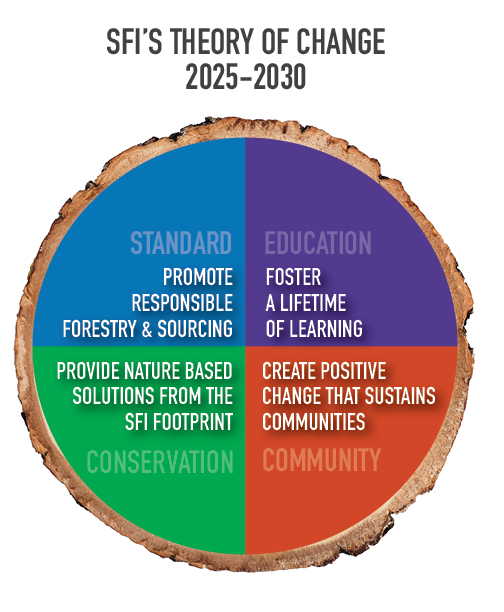Atlanta, GA—The Sustainable Forestry Initiative (SFI) unveiled its SFI 2025-2030 Strategic Direction at the 2024 SFI Annual Conference, deepening its commitment and setting a vision for a world that values and benefits from sustainably managed forests.
 “Sustainable forest management is critical to address the challenges facing our forests, including climate, fire, and species loss. SFI’s new strategic direction charts a path toward healthy forests through practical solutions, including standards, research, training, and community engagement. Our theory of change approach communicates the change we want to achieve while encouraging others to join us,” said Kathy Abusow, President and CEO of SFI.
“Sustainable forest management is critical to address the challenges facing our forests, including climate, fire, and species loss. SFI’s new strategic direction charts a path toward healthy forests through practical solutions, including standards, research, training, and community engagement. Our theory of change approach communicates the change we want to achieve while encouraging others to join us,” said Kathy Abusow, President and CEO of SFI.
The SFI 2025-2030 Strategic Direction consists of four strategies
Promoting responsible forestry and sourcing: SFI will develop and promote standards that provide an assurance of sustainable forestry and responsible sourcing of forest products. We will collaborate to achieve outcomes such as a greater appreciation for sustainable forest management in maintaining nature while providing responsibly sourced products, and increased trust and demand for SFI-certified products and SFI labels.
“Forest product customers are seeking greater assurances about the sustainability of the raw material in our products. The SFI strategic direction is focused on critical elements to deliver those assurances, through rigorous standards and on the ground results,” said Michael P. Doss, President and CEO of Graphic Packaging International and Chair of the SFI Board of Directors.
Providing nature-based solutions on the SFI footprint: SFI will support and advance forest management and fiber sourcing practices that deliver positive outcomes for climate, fire resilience, biodiversity, and water. Through our conservation collaborations, we will work to achieve outcomes such as increased use of credible data, metrics, research and reporting on conservation outcomes, and increased evidence that SFI and certified organizations provide nature-based solutions.
“Demand is growing for greater transparency around how to measure, monitor, and report on forests as nature-based solutions. SFI is well-positioned to advance relevant data, tools, and best practices that deliver conservation benefits,” said Catherine Grenier, President and CEO, Nature Conservancy Canada, and SFI Board Member.
Creating positive change with a diversity of communities: SFI will promote diverse and inclusive collaborations that lead to genuine progress in the forest and make a positive difference in people’s lives. Through our community collaborations, we will work to achieve outcomes such as greater utilization of SFI programs by a diversity of communities to advance their priorities and greater community health and resiliency.
“I applaud SFI for engaging in a participatory process to chart its future work and measure progress. The Arbor Day Foundation shares SFI’s commitment to increased collaboration with diverse communities. This is why, through our Tree Campus program, we’re excited to extend our reach through SFI’s network of PLT educators. In addition, we are prepared to support interested Tree Cities in becoming certified to the SFI Urban & Community Forest Sustainability Standard,” said Dan Lambe, Chief Executive, Arbor Day Foundation, and SFI Board Member.
Fostering a lifetime of learning: SFI will advance environmental education, forest literacy, and career pathways, using trees and forests as a window on the world. We will collaborate to achieve outcomes such as a diversity of communities advocating for sustainable forest management, environmental education, and career pathways, and increased employment in forest and conservation sectors among young adults from all communities.
‘‘PLT’s environmental education program is positioned to make a difference by connecting children and youth to trees, forests, and nature. I’m happy to see the focus on a lifetime of learning and working with a diversity of communities. PLT also makes connections to green jobs and opens up a world of opportunities for this generation to champion sustainable practices,’ said Ashley Hoffman, Executive Director, Kentucky Association for Environmental Education Kentucky, and SFI Board Member.
SFI utilized a “theory of change” framework with support from ORS Impact to develop the 2025-2030 strategic direction. A theory of change articulates the change we want to be part of, welcomes others to join us, and provides a basis for measurement and learning. More than 400 thought leaders representing SFI-certified organizations, conservation groups, academics, customers, educators, career pathways partners, and many others contributed to shaping the direction. SFI is uniquely positioned to drive meaningful change at scale through collaboration with its diverse networks.
About the Sustainable Forestry Initiative® Inc.
SFI advances sustainability through forest-focused collaborations. We are an independent, non‑profit organization that leverages four interconnected pillars of work: standards, conservation, community, and education. SFI works with the forest sector, conservation groups, academics, researchers, brand owners, resource professionals, landowners, educators, local communities, Indigenous Peoples, and governments. Collaborating with our network, we leverage SFI-certified forests and products as powerful tools to help solve sustainability challenges such as climate action, conservation of biodiversity, education of future generations, and sustainable economic development. Learn more: forests.org
Media Contact
Christine Leduc
Vice President, Communications
Sustainable Forestry Initiative
media@forests.org
ABOUT SFI
The Sustainable Forestry Initiative® (SFI) advances sustainability through forest-focused collaborations. We are an independent, nonprofit organization that leverages four interconnected pillars of work: standards, conservation, community, and education. SFI works with the forest sector, conservation groups, academics, researchers, brand owners, resource professionals, landowners, educators, local communities, Indigenous Peoples, and governments. Collaborating with our network, we leverage SFI-certified forests and products as powerful tools to help solve sustainability challenges such as climate action, conservation of biodiversity, education of future generations, and sustainable economic development.
MEDIA CONTACT
Christine Leduc
VP, Communications and Government Relations
Sustainable Forestry Initiative
613-706-1114
media@forests.org
